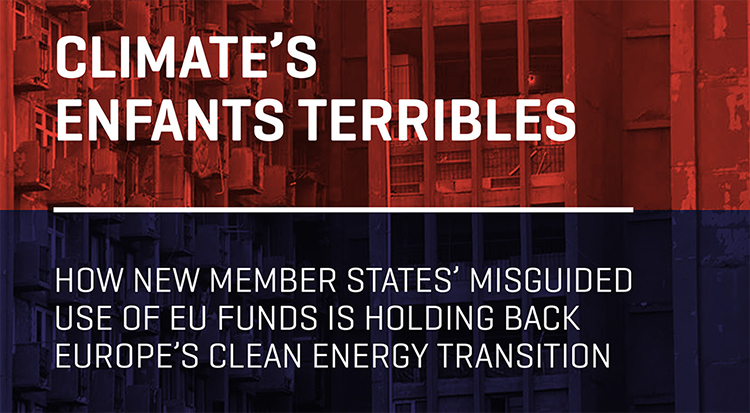NEW REPORT: Misguided spending by enfants terribles is undermining Europe’s transition to a fossil-free future
Brussels/Prague, 25 January 2016 – EU billions destined to transform the carbon-intensive, inefficient energy systems of central and eastern Europe are being misspent, finds a new report today by CEE Bankwatch Network and Friends of the Earth Europe. Bad spending plans and a lack of climate commitments from nine central and eastern European governments is hampering Europe’s transition away from fossil fuels, the groups say.
26 January 2016

Brussels/Prague – EU billions destined to transform the carbon-intensive, inefficient energy systems of central and eastern Europe are being misspent, finds a new report today by CEE Bankwatch Network and Friends of the Earth Europe. Bad spending plans and a lack of climate commitments from nine central and eastern European governments is hampering Europe’s transition away from fossil fuels, the groups say [1].
The full report can be downloaded here: https://bankwatch.org/sites/default/files/enfants-terribles.pdf
Summaries, graphs and more are at: https://bankwatch.org/enfants-terribles
The new research reveals that in CEE countries only 7 per cent of the 178 billion euros in European Regional Development and Cohesion Funds will be invested into renewables, energy efficiency and SMART grids, and that the integration of climate considerations into all plans and projects – as required under EU law – remains superficial.
Markus Trilling, EU funds campaigner for CEE Bankwatch Network and Friends of the Earth Europe said: “Whatever happened at the climate talks in Paris, Poland is still all about coal. We’re seeing EU funds being spent across Central and Eastern Europe for coal, gas and dated transport systems – locking countries into fossil-fuel dependency, at the expense of renewables and energy efficiency.”
The European Commission asked member states to concentrate EU funding on climate action and climate mainstreaming within the EU’s seven year, one trillion euro budget for 2014 to 2020 [2].
The report lays the blame squarely on the insufficient spending plans and absent climate commitments of the countries receiving the funding. For example, both Poland and the Czech Republic will offer financial support for the replacement of ‘old coal boilers’ with ‘modern coal boilers’ under the heading of environmental protection.
Estonia will retain carbon-intensive oil shale as its major energy source; Croatia and Estonia have received support for airport extensions – usually excluded from EU funds. In Romania, a third of all the money received will be spent on the transport sector, without any integral climate considerations [3].
Markus Trilling continued: “This is really ‘close your eyes and drive’ spending. CEE countries are prioritising energy intensive transport and fossil fuels over solutions to climate change. Energy efficiency goals have been reduced to footnotes, and the potential for citizens to shape the energy sector – through innovative community-owned and managed renewables – has been side-lined.”
The report includes a comprehensive set of recommendations for ensuring that EU funds contribute to Europe’s energy transition in a meaningful way. This includes the use of the upcoming EU budget midterm review as an opportunity to align funding in CEE countries with European efforts to tackle climate change.
For more information please contact:
Markus Trilling
EU funds campaigner for CEE Bankwatch Network and Friends of the Earth Europe
Email: markus@bankwatch.org
Tel: +32 (0) 484 056 636
Sam Fleet
Communications officer for Friends of the Earth Europe
Email: samuel.fleet@foeeurope.org
Tel: +32 (0) 470 072 049
Notes
[1] The report “Climate’s enfants terribles: how new Member States’ misguided use of EU funds is holding back Europe’s clean energy transition” is available at
https://bankwatch.org/sites/default/files/enfants-terribles.pdf
[2] Article 8 of Regulation (EU) no 1303/2013 of the European Parliament and of the Council (Common Provision Regulations for ESIF):
‘The objectives of the ESI Funds shall be pursued in line with the principle of sustainable development and with the Union’s promotion of the aim of preserving, protecting and improving the quality of the environment, as set out in Article 11 and Article 191(1) TFEU, taking into account the polluter pays principle. […]
The Member States and the Commission shall ensure that environmental protection requirements, resource efficiency, climate change mitigation and adaptation, biodiversity, disaster resilience, and risk prevention and management are promoted in the preparation and implementation of Partnership Agreements and programmes.’
[3] https://bankwatch.org/sites/default/files/enfants-terribles.pdf
Never miss an update
We expose the risks of international public finance and bring critical updates from the ground – straight to your inbox.
Institution: EU Funds
Theme: Energy & climate | Transport | Resource efficiency
Location: Czech Republic | Estonia | Croatia | Hungary | Latvia | Lithuania | Poland | Romania | Slovakia
Tags: Cohesion Policy | European Structural and Investment Funds | Regional Policy | climate action | coal | oil | roads

